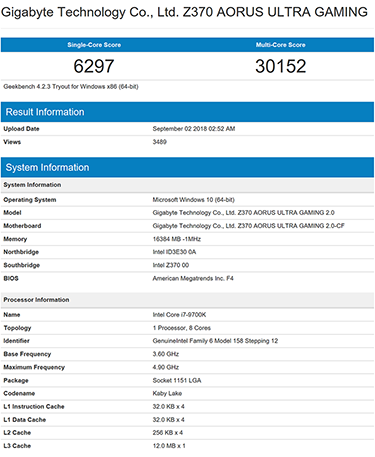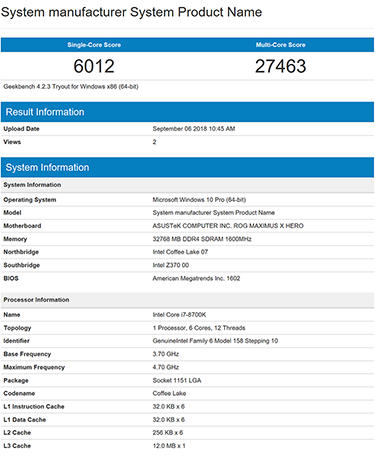Itching to get an idea of how the upcoming Intel Core i7-9700K processor will perform? You're in luck, as an anonymous individual appears to have submitted a 64-bit CPU benchmark to the public Geekbench database.
Before we dig into the results, a quick recap on what we know of the upcoming 9th Gen Core processors. Rumoured to be launching as soon as next month, the new CPUs go by the code name of 'Coffee Lake Refresh' and are expected to built on an optimised 14nm architecture that will herald the chip giant's first mainstream eight-core parts.
Championing the range will be the Core i9-9900K, an eight-core, 16-thread flagship with base and boost clocks of 3.6GHz and 5.0GHz, respectively. What's interesting this time around is that Intel appears to be using hyper-threading as a means of setting the Core i9 apart from the rest of the pack; our understanding is that K-Series Core i7 and Core i5 desktop CPUs will have the feature disabled, marking a surprise shift from previous generations.
In contrast to the current Core i7-8700K, which features six cores and 12 threads, the looming Core i7-9700K will be an eight-core, eight-thread part. Base clock will fall from 3.7GHz to 3.6GHz, while boost clock rises from 4.7GHz to 4.9GHz, but it will be interesting to see how the newcomer compares during real-world use given that it has two more physical cores but four fewer threads.
Geekbench isn't the test we typically turn to for high-end desktop CPUs, yet the early numbers do shed some light. In the screenshot (above, left) a Core i7-9700K returns a single-core score of 6,297 and a multi-core score of 30,152. To provide a comparison, we've run the same benchmark on our own Core i7-8700K test platform (above, right) and the results suggest that Coffee Lake Refresh is roughly five per cent quicker in a single-threaded scenario, and despite having fewer threads to work with, the eight physical cores deliver almost a 10 per cent boost in the multi-threaded test.
We're eager to see how the 9700K compares to AMD's eight-core, 16-thread Ryzen 7 2700X using our own benchmark suite, and we suspect we'll have the opportunity to find out soon, but in the meantime it seems Intel will continue to have the upper hand in the overclocking department. An earlier leak reportedly showed the Core i7-9700K hitting 5.5GHz with water-cooling, and now expreview reckons the chip will do 5.3GHz on air using just 1.215V. Either way, 2018 is turning out to be a fascinating year for CPU launches.















